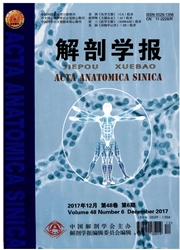

 中文摘要:
中文摘要:
目的7日龄新生大鼠短暂脑缺血诱导侧脑室室管膜下区(SVZ)神经干细胞增殖,观察胰岛素样生长因子1(IGF-1)对神经干细胞增殖的影响。方法7日龄新生SD大鼠64只,随机分为缺血组(n=24)、假手术组(n=24)、缺血阻断剂组(n=8)和缺血生理盐水组(n=8)。利用免疫组织化学方法观察缺血组和假手术组在缺血后1、4、7dSVZ新生细胞数量和IGF-1表达的变化,并观察缺血阻断剂组和缺血生理盐水组在IGF-1受体阻断剂(JB1)阻断7d后SVZ新生细胞数量和IGF-1表达的变化。结果与同时间点假手术组比较,缺血后1、4、7d的SVZ新生细胞和IGF-1阳性细胞数量均显著增加,差异有统计学意义(P〈0.05);使用JB1后,缺血阻断剂组IGF-1的表达被阻断,IGF-1阳性细胞缺如,而缺血生理盐水组IGF-1表达正常;使用JB1后,缺血阻断剂组SVZ新生细胞数量显著减少,与缺血生理盐水组相比,差异有统计学意义(P〈0.05)。结论新生大鼠缺血再灌注损伤上调了IGF-1的表达,IGF-1表达增加促使SVZ神经干细胞增殖;使用JB1后,IGF-1的表达被阻断,神经干细胞增殖也显著减少,提示IGF-1在脑缺血损伤修复中起关键作用。
 英文摘要:
英文摘要:
Objective To study the impact of insulin-like growth factor 1 (IGF-1) on the neural stem cell proliferation of the subventricular zone (SVZ) induced by transient forebrain ischemia in postnatal day 7 rats. Methods A total of 64 postnatal day 7 Sparuge-Dawley rats were randomly divided into ischemia group ( n = 24) , sham group( n = 24) , ischemia plus antagonist group ( n = 8) and ischemia plus saline group ( n = 8). The cell proliferation and IGF-1 in the SVZ of the ischemia group and the sham group were observed 1, 4 or 7 days after ischemia with immunohistochemical staining. The cell proliferation and IGF-1 in the SVZ of the ischemia plus antagonist group and the ischemia plus saline group were detected after 7 days of continuous treatment with JB1 or without JB1 treatment. Results The number of BrdU + cells and IGF-1 + cells of the ischemia group were significantly increased in the SVZ 1, 4, and 7 days after ischemia compared with that of the sham group (P 〈 0. 05). After the administration of JBI, the IGF-1 expression was blocked. The IGF-1+ cells were absent in ischemia plus antagonist group, while the IGF-1 expressed normally in ischemia plus saline group. The number of BrdU +cells in the ischemia plus antagonist was sharply decreased compared with the ischemia plus saline group ( P 〈 0.05 ) in the SVZ 7 days after ischemia. Conclusion Ischemia/perfusion up-regulates the expression of IGF-1 in neonatal rats, which may promote the proliferation of neural stem cells. Decrease of the neural stem cells proliferation dramatically after the administration of JB1 suggests that IGF-1 may play a key role on recovery of transient forebrain ischemia damage.
 同期刊论文项目
同期刊论文项目
 同项目期刊论文
同项目期刊论文
 Roux-en-Y gastric bypass promotes expression of PDX-1 and regeneration of beta-cells in Goto-Kakizak
Roux-en-Y gastric bypass promotes expression of PDX-1 and regeneration of beta-cells in Goto-Kakizak Cognitive improvement following transvenous adipose-derived mesenchymal stem cell transplantation in
Cognitive improvement following transvenous adipose-derived mesenchymal stem cell transplantation in Review of Evidence Suggesting That the Fascia Network Could Be the Anatomical Basis for Acupoints an
Review of Evidence Suggesting That the Fascia Network Could Be the Anatomical Basis for Acupoints an 期刊信息
期刊信息
